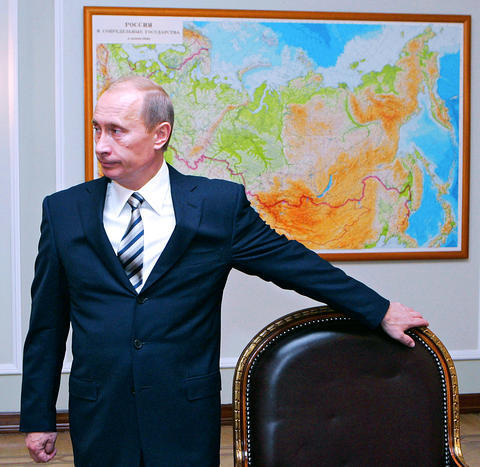Russia will set the date for presidential elections before the end of the month, the president of the upper house of parliament Sergei Mironov said in an interview with the newspaper Kommersant published yesterday.
"In line with the Russian constitution the Council of the Federation will set the date of the presidential election on Nov. 26," he said.
The paper said the vote would probably be held on March 2. The campaign for the presidential poll will start five days after the publication of the council's decision.

PHOTO: AP
Under the Constitution, Russian President Vladimir Putin cannot stand for a third term when his current term ends early next year.
Mironov said there was "no legal base to extend Vladimir Putin's powers. It is very late to change the Constitution," he added.
Putin announced on Oct. 1 that he would run for parliament in December heading the United Russia list and have a "realistic" shot at becoming prime minister, dropping a political bombshell that many thought could herald a fundamental change in the way Russia is governed.
Mironov said a victory of the United Russia party in the Dec. 2 elections to the State Duma "will give Vladimir Putin a moral right to take a more active part in domestic politics or to influence in a certain way foreign politics."
Putin has repeatedly said he will not change the Constitution for his own purposes, but insists that he will continue to be useful to the Russian people without saying how.
The Organization for Security and Cooperation in Europe announced Friday that it would send a skeleton crew of observers to cover Russia's December parliamentary elections, after Moscow said it would allow only 70 observers, compared with the 400 sent for parliamentary elections in 2003, said the organization's office responsible for monitoring elections.

The Burmese junta has said that detained former leader Aung San Suu Kyi is “in good health,” a day after her son said he has received little information about the 80-year-old’s condition and fears she could die without him knowing. In an interview in Tokyo earlier this week, Kim Aris said he had not heard from his mother in years and believes she is being held incommunicado in the capital, Naypyidaw. Aung San Suu Kyi, a Nobel Peace Prize laureate, was detained after a 2021 military coup that ousted her elected civilian government and sparked a civil war. She is serving a

‘NO AMNESTY’: Tens of thousands of people joined the rally against a bill that would slash the former president’s prison term; President Lula has said he would veto the bill Tens of thousands of Brazilians on Sunday demonstrated against a bill that advanced in Congress this week that would reduce the time former president Jair Bolsonaro spends behind bars following his sentence of more than 27 years for attempting a coup. Protests took place in the capital, Brasilia, and in other major cities across the nation, including Sao Paulo, Florianopolis, Salvador and Recife. On Copacabana’s boardwalk in Rio de Janeiro, crowds composed of left-wing voters chanted “No amnesty” and “Out with Hugo Motta,” a reference to the speaker of the lower house, which approved the bill on Wednesday last week. It is

‘EAST SHIELD’: State-run Belma said it would produce up to 6 million mines to lay along Poland’s 800km eastern border, and sell excess to nations bordering Russia and Belarus Poland has decided to start producing anti-personnel mines for the first time since the Cold War, and plans to deploy them along its eastern border and might export them to Ukraine, the deputy defense minister said. Joining a broader regional shift that has seen almost all European countries bordering Russia, with the exception of Norway, announce plans to quit the global treaty banning such weapons, Poland wants to use anti-personnel mines to beef up its borders with Belarus and Russia. “We are interested in large quantities as soon as possible,” Deputy Minister of National Defense Pawel Zalewski said. The mines would be part

Cozy knits, sparkly bobbles and Santa hats were all the canine rage on Sunday, as hundreds of sausage dogs and their owners converged on central London for an annual parade and get-together. The dachshunds’ gathering in London’s Hyde Park came after a previous “Sausage Walk” planned for Halloween had to be postponed, because it had become so popular organizers needed to apply for an events licence. “It was going to be too much fun so they canceled it,” laughed Nicky Bailey, the owner of three sausage dogs: Una and her two 19-week-old puppies Ember and Finnegan, wearing matching red coats and silver